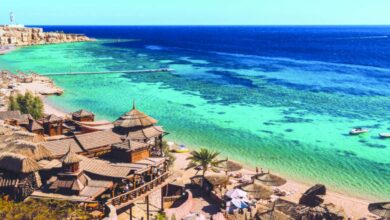Hurghada–A simmering row between diving centers and the diving industry’s national regulator is muddying the waters of Egypt’s LE15 billion diving industry.
The accusations started flying last year when a number of local diving center owners accused the board of the Chamber of Diving and Water Sports (CDWS) of mismanagement and corruption. CDWS board members, for their part, say the charges were issued by disgruntled individuals after their dive centers were blacklisted by the chamber.
“This dispute is really getting ugly,” said a Hurghada-based divemaster. “Each side knows the other’s dirty laundry and it’s all being made public.”
The CDWS, a regulatory organization formed in 2007 under the umbrella of the Egyptian Tourism Federation, was ostensibly created to regulate all diving and recreational water activities in Egyptian coastal waters. In effect, it supervises some 450 member diving centers and safari boat operators to ensure that they meet the minimum equipment, maintenance and service levels for safe operation.
Diving centers and safari boat operators that pass a CDWS audit, and pay registration fees, are granted ISO certification and membership in the chamber–a prerequisite for receiving an operating license from the Ministry of Tourism. Those that fail are placed on the chamber’s blacklist and are subject to having their operating licenses refused or revoked.
The auditing process is a controversial one. Some diving center operators claim it is a smokescreen to disguise a biased and opaque licensing process. They charge that dodgy operators “who play ball” are granted licenses, while decent operators–particularly competitors of CDWS board members’ own business interests–are blacklisted for minor infractions and forced out of business.
It all boils down to money, says a Facebook group called “Say no to the CDWS.”
“[The CDWS is run by] opportunists who have no qualms about putting ill-gotten money into their pockets, and hurting their competitors. Some of these parasites continue to run their private businesses, using their positions in the CDWS to their advantage and [to] the disadvantage of competitors, while being paid a huge salary by the CDWS,” the group said in a statement.
The first CDWS board election in November 2008 named Hisham Gabr, owner of Camel Dive Club in Sharm El-Sheikh, as chairman. The board members, elected for three year terms, have–according to one angry diving center owner–colluded to consolidate their control over the lucrative industry.
“The chamber is being run by a gang of thieves,” charges Ashraf Sabry, owner of Alexandria Dive, an Alexandria-based diving center on the CDWS blacklist. “The problem is that these thieves are backed by the minister of tourism.”
According to Sabry, the CDWS is facing dozens of lawsuits from wrongfully blacklisted dive centers, and its board is currently under investigation for corruption. He also claims to have documents that prove the chamber paid police and coast guard officials to act as its enforcers.
“These people are using our money to buy authority that has the power to stop [dive boats] and diving centers from working,” Sabry told Al-Masry Al-Youm. “Two hundred diving centers and 1,800 diving instructors are out of work because of this illegitimate chamber. Each diving center is worth between LE3 million and LE200 million, so you’re talking about billions of pounds lost because of this corruption.”
Zeyad El-Bassel, a CDWS board member and head of the Technical Committee, refutes the charges. He says the chamber was formed to end two decades of diving industry self-regulation that allowed anyone with a couple of cylinders and a dubiously acquired divemaster certificate to open a diving center.
“Before the CDWS… there were no rules and regulations for diving centers–you could have old equipment, poor maintenance and improper premises and still get [an operating] license,” he recalled.
CDWS discovered that the fragmentation of the diving industry had caused a notable deterioration in quality and had served to skew prices, he explained. In response, the chamber established equipment and operating requirements for all diving centers and liveaboards “that were clear and in black and white,” and which aimed at removing the deadwood.
“To compete in this industry you must have your own kitchen,” El-Bassel asserted. “If you cannot afford to have 60 tanks and a filling station with a capacity of 250 liters per minute, you will not have enough [capital] to run your operation and hire proper guides or instructors. All you’ll do is try to find out how much [competitors are] selling for and attempt to [undercut] them… to steal their customers.”
Some business owners say the equipment requirements have unfairly forced the closure of small, specialized diving centers and even a center for recreational freediving, an activity that does not require any scuba equipment.
“According to [CDWS], we are a dive center and need a dive license, with… 60 tanks, a compressor, scuba diving equipment and whatnot,” said Linda Paganelli, co-founder of Freedive Dahab. “Problem is, I would even be willing to do that, but it’s impossible since they stopped issuing diving licenses in 2008 because there are too many diving centers in Dahab.”
CDWS also adopted a new international quality standard for service provision. Dive centers and liveaboards were given until the end of 2008 to comply with the EN 14467/ISO 24803 standard.
“We had to assure that dive professionals were qualified,” said El-Bassel. “The pilot has to fly the airplane–you cannot have the stewardesses flying the plane.”
He estimates that 40 percent of diving centers and liveaboards were already meeting the equipment and service standards, others just needed a gentle push, while a small but vocal minority resented the additional investment required. In total, he says only 50 dive centers were blacklisted and 15 were shut.
El-Bassel dismisses allegations that the CDWS board is squandering membership dues on extravagent PR campaigns or buying off officials by offering them first-class air tickets.
“We’ve invited a lot of officials and media people to come and see what we’re doing,” he said. “If we invite them, we pay for their ticket… as any other business organization would.”
Like any new entity, the CDWS has suffered teething pains. Irreconcilable differences between board members over the direction and policies of the chamber have led to a series of stormy meetings and several resignations.
“I disagreed with how things were being run, but corruption? I doubt it,” said one former CDWS board member. “These charges are coming from smaller dive operations who know that if they have to meet the chamber’s equipment and safety standards it will cost a lot and they’ll no longer be able to offer the cheapest prices.”




